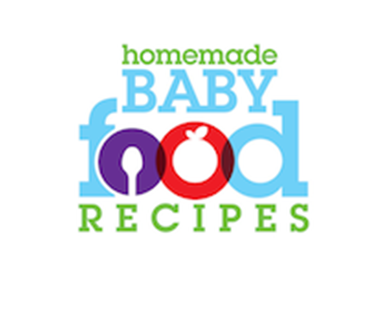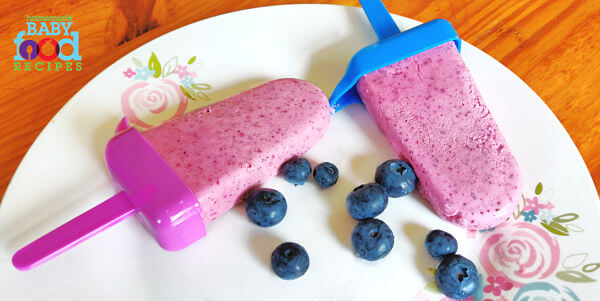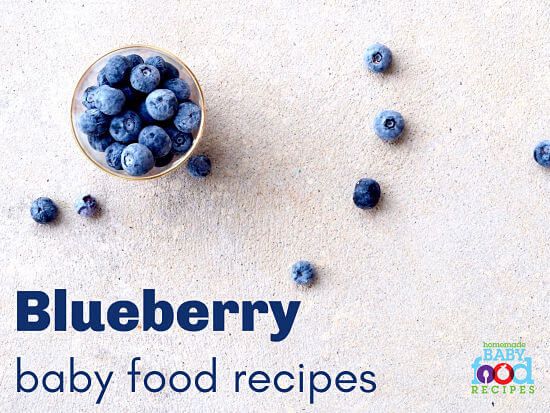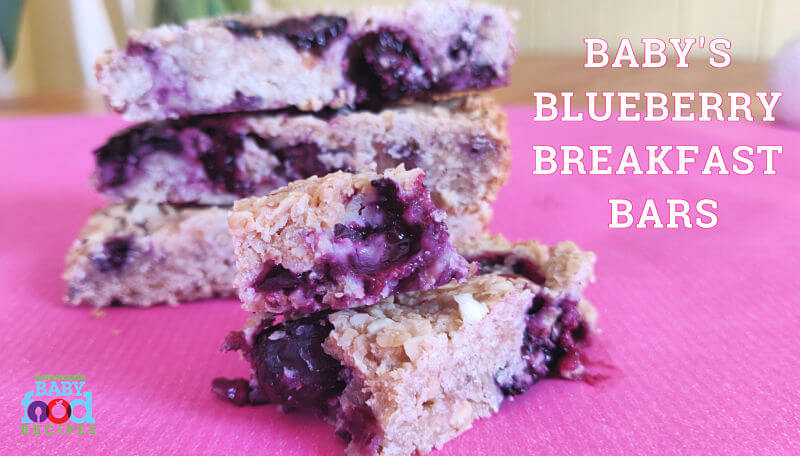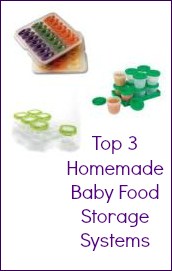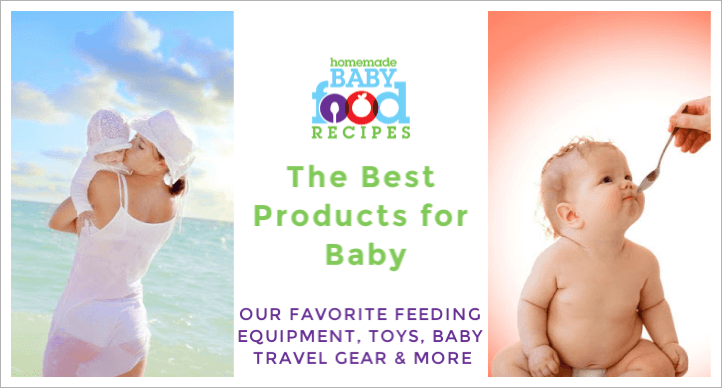Blueberry Baby Food Recipes
Updated: July 31, 2023
Tantalize baby’s taste buds with these fantastic blueberry baby food recipes – and learn more about introducing these nutritious treats to your little one!
When can my baby eat blueberries?
Unrelated to strawberries and raspberries – and related instead to the less allergenic cranberries and bilberries – blueberries are not subject to the usual ‘berry baby food’ rules!
Whilst medical professionals sometimes recommend waiting until at least 12 months before introducing other berries (strawberries in particular), blueberries are not as likely to cause allergic reactions.
Many pediatricians will suggest offering them to your baby at some point between 6 and 9 months of age.
Please remember, though, that a risk of allergy to blueberries DOES still exist – and you should watch your baby carefully once you have introduced them.
Signs of an allergy to blueberries include
- congestion
- wheezing
- coughing
- fatigue
- itchy/swollen eyes
- swollen lips
- itchy rash
- hives
Blueberries may not be suitable for babies with G6PD Deficiency – please see this page for more information
Blueberry facts
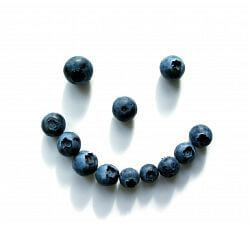
Blueberries are native to North America, where they are in season from May to October.
They are also grown in a few other parts of the world, including Australia, South America and – more recently – the UK and Ireland!
Whilst truly fresh blueberries are unbeatable for taste and texture, they are also available individually quick frozen – possibly the only form available in some parts of the world.
Frozen blueberries are acceptable for use in baby food as long as you can feel them moving freely in the bag – if they are all stuck together, then they have probably thawed and refrozen at some point.
This will affect both their taste and nutritional quality ( more about making baby food with frozen vegetables and fruits here).
Blueberries are also available canned, although sugar is often added, making them less desirable for use in your baby food recipes.
Why blueberries are a ‘superfruit’
Recent research has shown blueberries to be one of the best sources of antioxidants, containing even more of these valuable nutrients than other superstars like cranberries and red grapes!
Source: Cellular antioxidant activity (CAA) assay for assessing antioxidants, foods, and dietary supplements
The role of antioxidants in the human body is varied – helping prevent conditions such as peptic ulcers, cataracts, glaucoma, hemorrhoids, varicose veins – and serious diseases such as heart disease and cancer.
The anthocyanins in blueberries (which give them their distinctive colour) are believed to protect the brain and – in later life – limit the effects of conditions such as Alzheimer’s Disease.
And new research has shown that blueberries can significantly boost baby’s brainpower – see this post on our blog for more information!
What’s more, blueberries are also packed with manganese, vitamin B6, vitamin C, vitamin K and fibre.
Fresh blueberries have a very mild laxative effect on the body, meaning that they can be very useful in preventing and relieving constipation.
Dried blueberries, on the other hand, seem to have the opposite effect and are often recommended for firming up the stools after a bout of diarrhea.
Another interesting characteristic of blueberries is their ability to prevent urinary tract infections, in much the same way as cranberries do.
If your child experiences frequent urinary tract infections, then including blueberries in his diet or offering blueberry juice will be a far more palatable and popular solution for him than offering cranberries!
PLEASE NOTE: Eating lots of blueberries can make your baby’s poop look almost black in colour – so beware!
from our blog:
a frozen blueberry treat…
Choosing and storing blueberries
Fresh blueberries are very delicate and should be handled very carefully.
- Look for blueberries covered with a greyish white, waxy bloom.
This protects the berries from deterioration and should not be washed off until JUST before you’re ready to eat them. - Look for berries with a good, uniform colour – they can be blue, purple black or maroon.
- Choose firm blueberries that are rolling around loosely in their container – soft, squashy berries will begin to mould very quickly.
- Keep fresh blueberries in the refrigerator and try to use within 2 to 3 days.
- If possible, buy organic!
They will require less washing and will be less damaged in the process. - If you have bought more fresh blueberries than you can use, then freeze them!
Just spread them in a single layer on a lined baking sheet and place them in the freezer. Move them to suitable freezer containers or bags once they’ve frozen.
Why jarred blueberry baby food is less nutritious
Many commerical baby foods list blueberries as an ingredient – so are these foods just as good for your baby as homemade?
Well, tests have demonstrated that anthocyanins (the colourful plant pigments responsible for many of the health benefits of blueberries) are destroyed during processing.
This means that any processed foods containing blueberries lack the nutritional qualities offered by the fresh fruit – and that includes commercial baby food.
You can read more about the effects of processing on our strawberry baby food page.
Blueberry baby food ideas
Our little ones were enjoying whole, fresh blueberries as a finger food from 7 months of age.
Some sources recommend cutting blueberries in half to minimize the choking hazard – we never actually had a problem in this respect, as our little ones seemed able to ‘gum’ blueberries very effectively!
Of course, all babies are different and you should follow your own instincts – and your doctor’s advice – before offering them to your baby as a finger food.
Here are some more blueberry baby food ideas…
- Serve frozen blueberries in a mesh feeder – very soothing for teething tots (beware the blue face afterwards, though!).
- Throw a handful of fresh or frozen blueberries into your baby’s smoothies.
- Stir mashed or pureed blueberries into mashed banana – a perfect combination!
- Stir mashed or pureed blueberries into oatmeal or rice cereal.
- Use blueberries to add a fruity twist to your baby’s homemade yogurt.
- Mash blueberries with cream cheese for a unique and interesting fruity spread or dip.
Blueberry baby food recipes
Apple, Pear and Blueberry Puree (6 months+)
1 small, sweet apple, peeled, cored and diced
1/2 ripe pear, peeled, cored and diced
4oz (1/2 cup) fresh blueberries
- Remove any stems from the blueberries, then place all the ingredients in a small saucepan.
- Just cover with water and simmer gently for approximately 5 mins, until the fruits are tender.
- Drain (reserving the cooking water), then transfer the ingredients to a blender and puree until smooth.
- Use the reserved cooking liquid to thin the puree, if necessary.
Readers' Pics

Apple, pear and blueberry puree
This puree is so delicious…. sometimes mommy sneaks some for herself!!
Cally Adams
Peach and Blueberry Cereal (6 months+)
1 small, ripe peach
4oz (1/2 cup) fresh blueberries
prepared infant rice cereal (here’s a recipe to make your own)
- Cut an ‘x’ into the side of the peach and place it ‘x’ side down in a small saucepan.
- Add around 1 inch of water and simmer for 5 mins.
- Add the blueberries and simmer for a further 5 mins.
- Cool to a handling temperature, then remove the skin from the peach (it should slip off easily).
- Mash or puree the peach and blueberries together, then stir into the prepared rice cereal.
Blueberry Custard (6 months+)
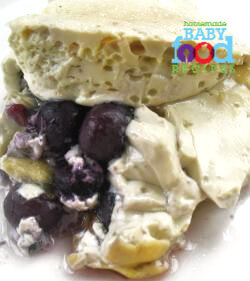
2 beaten egg yolks
8 fl oz (1 cup) whole (full fat) milk, breast milk or formula
4oz (1/2 cup) fresh blueberries, mashed
1 tsp vanilla extract
- Preheat oven to 350 degrees (180 deg C).
- Place the prepared blueberries into the bottom of a small, oven-proof dish.
- Combine the beaten egg yolk with the milk and vanilla extract.
- Pour the egg mixture over the blueberries.
- Sit the oven-proof dish in the middle of a high-sided baking pan and pour water into the pan until it comes around half way up the sides of the oven-proof dish.
- Transfer the baking pan to the oven and cook for 30 mins, until set.
- Cool and store in the refrigerator.
- Serve chilled.
Pork with Blueberry and Apple Sauce (7 months+)
4oz pork loin, cubed
1 apple, peeled, cored and diced
2oz (1/4 cup) blueberries
4 fl oz (1/2 cup) homemade or low sodium chicken stock
- Put the cubed pork into a small saucepan and pour in the stock.
- Simmer for 5 minutes.
- Add the diced apple and the blueberries and simmer for a further 5-10 mins, until the apple is tender and the pork is cooked through.
- Puree or mash all the ingredients together and serve with pasta, rice or potatoes.
Blueberry and Cous Cous Dessert (for babies enjoying texture)
2oz (1/2 cup) uncooked cous cous (use the whole wheat variety if available)
apple juice
4oz (1/2 cup) natural yogurt
6oz (3/4 cup) fresh blueberries
- Place the blueberries in a small saucepan and cover with water.
- Simmer for 5 mins, then drain, reserving the water.
- Prepare the cous cous according to the directions on the pack, using the cooking water instead of plain water and topping up with apple juice as necessary.
- Combine the cooked cous cous with the blueberries and yogurt and place in the refrigerator.
- Serve chilled.
Blueberry Pancakes (12 months+)
1 cup (4 oz) whole wheat flour
1 tsp baking powder
8 fl oz (1 cup) cow’s milk, breast milk or formula
1 whole egg
oil
4oz (1/2 cup) fresh blueberries
- Mix the wet ingredients in one bowl and the dry ingredients in another.
- Combine the wet and dry ingredients, then gently stir in the blueberries.
- Spoon the mixture into a non-stick frying pan, 2-3 tablespoons at a time, and fry for around 1 minute on each side.
NOTES: If you are baking with frozen blueberries, DON’T thaw them before use. If you do, the colour will ‘bleed’ through the food you are making.
And in a recipe containing both baking soda and blueberries, you may find that the blueberries turn green! This is not harmful and is the result of a reaction between the baking soda and the yellow pigment in blueberries.
Homemade baby food equipment…
Homemade baby food accessories
